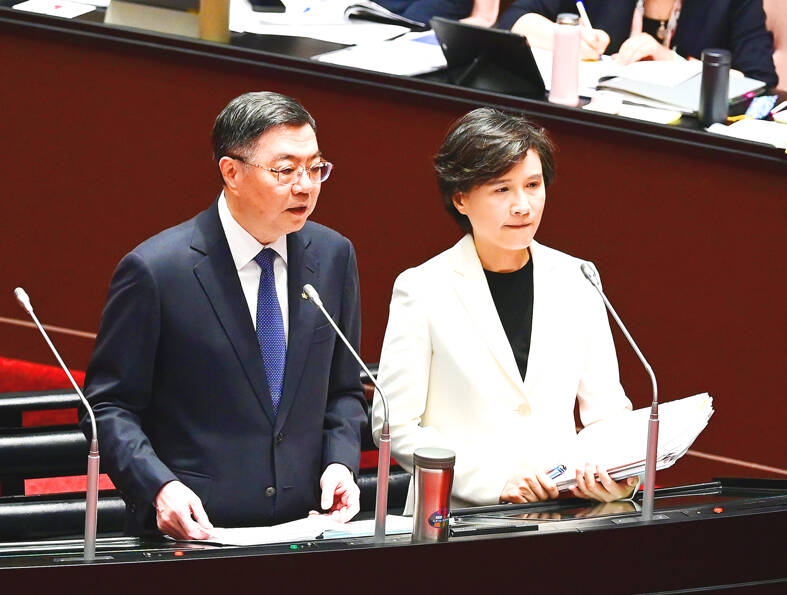The government and industry are in agreement that Taiwan’s industrial roots must stay in Taiwan to maintain the nation’s leading position in key industries, Premier Cho Jung-tai (卓榮泰) said at the Legislative Yuan in Taipei yesterday.
Cho was responding to questions by lawmakers about the possibility of Taiwan’s semiconductor industrial chain moving to the US.
The US’ “reciprocal” tariffs took effect on Aug. 7, and Taiwan negotiated a reduction from the base rate plus 32 percent to the base rate plus a provisional tariff of 20 percent.

Photo: Ritchie B. Tongo, EPA-EFE
Cho was asked to deliver a report to the legislature yesterday on the progress of Taiwan-US trade talks and their possible impact on Taiwanese industries.
Asked about the goals of the US tariff negotiations, Vice Premier Cheng Li-chiun (鄭麗君), who led a delegation in several rounds of trade negotiations with US officials, told lawmakers that they include discussions of the reciprocal tariffs and Section 232 of the Trade Expansion Act of 1962, and Taiwan’s bid that the final tariff rate would not be “stacked” on top of old ones.
Since Aug. 1, the group has held three videoconferences for the trade talks, she said, adding that the trade team would proactively strive for any arrangement that is beneficial to the negotiations.

Photo: Wang Yi-sung, Taipei Times
The wrap-up meeting is to be held in the US, and the delegation is ready to head over at any time, Cheng said.
Democratic Progressive Party (DPP) Legislator Lee Kun-cheng (李坤城) asked if the US demanded that Taiwan’s semiconductor industry invest in the US in exchange for zero tariffs, and whether companies in the semiconductor supply chain would also have to move to the US.
Cheng said the Cabinet has held talks with semiconductor-related companies, including upstream suppliers of materials, equipment and chips, as well as downstream servers and other products, to better understand their position on investing in the US.
Cho said that the government’s and industry’s consensus is Taiwan’s industrial roots must stay in the nation — which would not only involve high-tech industries — for Taiwan to maintain its leading position in key industries.
While keeping their industrial roots in Taiwan, they must have a global strategy, he said, adding that the “Taiwan Plus One” strategy offers one way to keep high-tech research and development in Taiwan.
As the US wants to revitalize its manufacturing industries, especially those related to artificial intelligence (AI) and semiconductors, Taiwan proposed supply chain cooperation, which would be beneficial to Taiwanese industries’ global strategy, he said.
DPP Legislator Lin Tai-hua (林岱樺) asked Cheng about the impact of tariff negotiations on traditional industries and whether they would be considered expendable bargaining chips in negotiations.
Lin said that Taiwan’s semiconductor sector has an output value of about NT$6 trillion (US$197 billion) and a workforce of about 1.21 million, while traditional industries, such as steel, petrochemicals and agriculture, employ about 2.5 million people, despite their lower output value.
Lin expressed concern over the possibility of the semiconductor, and information and communications technology industries being prioritized in negotiations at the expense of other industries.
“I don’t think so,” Cheng said.
Lin pressed on and asked whether Cheng’s reply meant that “absolutely none of the industries would be sacrificed.”
“Of course not,” Cheng said, adding that the government is seeking to lower the 20 percent “reciprocal” tariff primarily because many traditional industries would be severely affected.
Some products, including steel, auto parts, pharmaceuticals and semiconductors, are excluded from tariffs due to national security reasons, under Section 232 of the US Trade Expansion Act, although discussions with Washington continue, Cho said.
A reassessment showed that the tariff change reduced projected impacts on “exports, production, GDP and jobs” by about half, but the government would still conduct a comprehensive review of sectors, he added.
Taiwanese industries most affected include hand tools, machine tools, hardware, heavy electrical equipment and plastic products, Cho said.
As for agriculture, moth orchids, edamame soybeans and mahi-mahi fish are also affected, he said.
The government would provide relief assistance through a special “resilience” budget and consider overall employment stability, Cho said, adding that 73 firms and 2,388 workers have already been directly affected by the tariffs.
Taiwan’s tariff talks with the US remain focused on three goals: securing a better rate, ensuring a fair process under US trade law and preventing overlapping tariffs, he said.
“Once an agreement is reached, it will be submitted to the Legislative Yuan under the Conclusion of Treaties Act,” Cho said.

A magnitude 5.6 earthquake struck off the coast of Yilan County at 12:37pm today, with clear shaking felt across much of northern Taiwan. There were no immediate reports of damage. The epicenter of the quake was 16.9km east-southeast of Yilan County Hall offshore at a depth of 66.8km, Central Weather Administration (CWA) data showed. The maximum intensity registered at a 4 in Yilan County’s Nanao Township (南澳) on Taiwan’s seven-tier scale. Other parts of Yilan, as well as certain areas of Hualien County, Taipei, New Taipei City, Taoyuan, Hsinchu County, Taichung and Miaoli County, recorded intensities of 3. Residents of Yilan County and Taipei received

Taiwan has secured another breakthrough in fruit exports, with jujubes, dragon fruit and lychees approved for shipment to the EU, the Ministry of Agriculture said yesterday. The Animal and Plant Health Inspection Agency on Thursday received formal notification of the approval from the EU, the ministry said, adding that the decision was expected to expand Taiwanese fruit producers’ access to high-end European markets. Taiwan exported 126 tonnes of lychees last year, valued at US$1.48 million, with Japan accounting for 102 tonnes. Other export destinations included New Zealand, Hong Kong, the US and Australia, ministry data showed. Jujube exports totaled 103 tonnes, valued at

TRUST: The KMT said it respected the US’ timing and considerations, and hoped it would continue to honor its commitments to helping Taiwan bolster its defenses and deterrence US President Donald Trump is delaying a multibillion-dollar arms sale to Taiwan to ensure his visit to Beijing is successful, a New York Times report said. The weapons sales package has stalled in the US Department of State, the report said, citing US officials it did not identify. The White House has told agencies not to push forward ahead of Trump’s meeting with Chinese President Xi Jinping (習近平), it said. The two last month held a phone call to discuss trade and geopolitical flashpoints ahead of the summit. Xi raised the Taiwan issue and urged the US to handle arms sales to

BIG SPENDERS: Foreign investors bought the most Taiwan equities since 2005, signaling confidence that an AI boom would continue to benefit chipmakers Taiwan Semiconductor Manufacturing Co’s (TSMC, 台積電) market capitalization swelled to US$2 trillion for the first time following a 4.25 percent rally in its American depositary receipts (ADR) overnight, putting the world’s biggest contract chipmaker sixth on the list of the world’s biggest companies by market capitalization, just behind Amazon.com Inc. The site CompaniesMarketcap.com ranked TSMC ahead of Saudi Aramco and Meta Platforms Inc. The Taiwanese company’s ADRs on Tuesday surged to US$385.75 on the New York Stock Exchange, as strong demand for artificial intelligence (AI) applications led to chip supply constraints and boost revenue growth to record-breaking levels. Each TSMC ADR represents